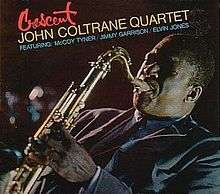Crescent (John Coltrane album)
| Crescent | ||||
|---|---|---|---|---|
 | ||||
| Studio album by John Coltrane | ||||
| Released | July 1964[1] | |||
| Recorded |
April 27 and June 1, 1964 Van Gelder Studio, Englewood Cliffs, New Jersey, United States | |||
| Genre | Jazz, hard bop, post-bop, modal jazz | |||
| Length | 40:10 | |||
| Label | Impulse! A-66 | |||
| Producer | Bob Thiele | |||
| John Coltrane chronology | ||||
| ||||
| Professional ratings | |
|---|---|
| Review scores | |
| Source | Rating |
| Allmusic | |
| Entertainment Weekly | (positive)[3] |
| The Penguin Guide to Jazz | |
| The Village Voice | (positive)[5] |
| The Rolling Stone Jazz Record Guide | |
Crescent is a 1964 studio album by jazz musician John Coltrane, released by Impulse! as A-66. Alongside Coltrane on tenor saxophone, the album features McCoy Tyner (piano), Jimmy Garrison (double bass) and Elvin Jones (drums) playing original Coltrane compositions.
Coltrane does not solo at all on side two of the original LP; the ballad "Lonnie's Lament" instead features a long bass solo by Garrison. The album's closing track is an improvisational feature for Jones (with spare melodic accompaniment from Coltrane's tenor sax and Garrison's bass at the song's beginning and end): Coltrane continued to explore drum/saxophone duets in live performances with this group and on subsequent recordings such as the posthumously released Interstellar Space (with Rashied Ali).
Recording and production
The quartet went into Rudy Van Gelder's studio on April 27, 1964, and performed all five of the songs on this album as well as a short version of "Song of Praise"—which was recut in May 1965 and compiled on The John Coltrane Quartet Plays. They returned to the studio on June 1, 1964, and recorded versions of the title track and "Bessie's Blues", which ended up on the album. The three rejected recordings from April 27 are compiled on The Classic Quartet: The Complete Impulse! Recordings.
The album's liner notes are written by Nat Hentoff, and the original LP's inner gatefold profile photograph of Coltrane was also featured on the cover of Coltrane's next Impulse! album release, A Love Supreme.
Legacy
An earlier version of "Lonnie's Lament" appears on Afro-Blue Impressions, and an almost hour-long version of "Crescent" was recorded on Live in Japan. The entire album was collected on The Classic Quartet: The Complete Impulse! Recordings. Coltrane later performed the song "After the Crescent", which appeared on 1965's To the Beat of a Different Drum.
The title track was later covered by Alice Coltrane for 2004's Translinear Light and McCoy Tyner on his 1991 album Soliloquy. Tyner recorded it again live for the albums McCoy Tyner Plays John Coltrane: Live at the Village Vanguard and Live at Sweet Basil. Guitarist Steve Lukather is the soloist on the version recorded for the 2005 tribute album A Guitar Supreme.[7] The SFJAZZ Collective covered four of the songs on their SFJAZZ Collective 2, with Nicholas Payton and Joshua Redman soloing on the title track.[8]
Garrison's widow recalled that this album along with A Love Supreme were the two he listened to the most.[9]
Track listing
All songs composed by John Coltrane and published by Jowcol Music (BMI)
Side one
- "Crescent" – 8:41
- "Wise One" – 9:00
- "Bessie's Blues" – 3:22
Side two
- "Lonnie's Lament" – 11:45
- "The Drum Thing" – 7:22
Personnel
John Coltrane Quartet
- John Coltrane – band leader and tenor saxophone
- McCoy Tyner – piano
- Jimmy Garrison – double bass
- Elvin Jones – drums
Technical personnel
Compact Disc release
- Michael Cuscuna – production and liner notes
- Eric Labson – digital remastering
- Joe Alper – photography
- Chuck Stewart – photography
References
Notes
- ↑ Billboard July 11, 1964
- ↑ Michael G. Nastos. "Crescent Overview". Allmusic. Retrieved October 18, 2009.
- ↑ Tony Scherman (December 26, 1998). "John Coltrane Quartet The Classic Quartet-Complete Impulse Studio Recordings". Entertainment Weekly. Retrieved October 18, 2009.
- ↑ Cook, Richard; Morton, Brian (2008). The Penguin Guide to Jazz Recordings (9th ed.). Penguin. p. 289. ISBN 978-0-141-03401-0.
- ↑ Frances Davis (May 30, 2006). "The John Coltrane Guide". The Village Voice. Retrieved October 18, 2009.
- ↑ Swenson, J. (Editor) (1985). The Rolling Stone Jazz Record Guide. USA: Random House/Rolling Stone. p. 46. ISBN 0-394-72643-X.
- ↑ Milkowski, Bill (November 2005). "Giant Steps Rocks". Jazziz. pp. 32–33.
- ↑ Freeman, Phil (June 2006). "Rev. of SFJAZZ Collective, SF JAZZ Collective 2". Jazziz. pp. 55–56.
- ↑ Kahn (2002), p. 222.
Bibliography
- Kahn, Ashley (2002). A Love Supreme: The Story of John Coltrane's Signature Album (1st ed.). Viking Press. ISBN 978-0-14-200352-7.